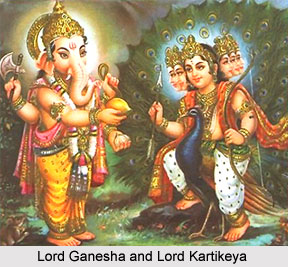 The Legend of Lord Ganesha and Kartikeya is mentioned in various Mahapuranas and Upapuranas, which are ancient religious texts in Hinduism. Lord Ganesha, also known as Ekadanta, Vighneshvara and Ganapati, is the brother of Lord Kartikeya (Skanda) and the son of Lord Shiva and Goddess Parvati. He is one of the most popular Hindu Gods, who is also venerated by Jains and Buddhists. Ganesha is regarded as the destroyer of pride, selfishness and vanity and the Lord of Beginnings and Success. Lord Kartikeya, also known as Shadanana, Sanmukha, Subramaniam and Murugan, is the God of War and victory. He is the 2nd son of Lord Shiva and Goddess Uma (Parvati). Kartikeya was born to obliterate the demons or asuras.
The Legend of Lord Ganesha and Kartikeya is mentioned in various Mahapuranas and Upapuranas, which are ancient religious texts in Hinduism. Lord Ganesha, also known as Ekadanta, Vighneshvara and Ganapati, is the brother of Lord Kartikeya (Skanda) and the son of Lord Shiva and Goddess Parvati. He is one of the most popular Hindu Gods, who is also venerated by Jains and Buddhists. Ganesha is regarded as the destroyer of pride, selfishness and vanity and the Lord of Beginnings and Success. Lord Kartikeya, also known as Shadanana, Sanmukha, Subramaniam and Murugan, is the God of War and victory. He is the 2nd son of Lord Shiva and Goddess Uma (Parvati). Kartikeya was born to obliterate the demons or asuras.
The legend states that both Ganesha and Kartikeya used to play with their parents during their childhood. Shiva and Parvati offered them a divine fruit that contained the nectar of the ultimate knowledge and immortality. Both the brothers wanted the fruit for themselves. But in order to obtain the heavenly fruit, both Ganesha and Kartikeya had to compete against each other. Their parents declared that the one, who revolves around the world for three times and reaches back to their abode in Mount Kailash first, would become the winner. The winner of the race would receive the fruit as his reward. Lord Kartikeya immediately mounted his divine vahana, the peacock, and went away flying into the sky. He visited every holy site that came in his way and prayed to the gods and deities.
Lord Ganesha knew he was bulky and his mount, the sacred mouse, was not as fast as Kartikeya`s peacock. He would never be able to beat his brother if he went around a tour of the world. Thus the elephant headed deity used his wisdom and asked his parents to sit together. Then Ganesha revolved around Lord Siva and Goddess Parvati with utmost devotion and demanded for the prize of his victory. When Shiva said that he did not go around the world, Ganesha replied that he revolved around his parents as they parents represent the entire world. Thus both his parents declared Lord Ganesha as the winner and gave him the divine fruit.
In another version of the legend, it states that once Kartikeya and Ganesha argued about being the elder brother. When they asked their father, Lord Shiva, he declared that the first one who travels around the world and returns first to Mount Kailash will achieve the right to be the elder brother. Thus both the brother participated in the competition and Lord Ganesha became the winner. Thus he was announced as the elder of the 2 brothers. This tale portrays the intellect and wisdom of Lord Ganesha, which he uses against physical strength and force.




















